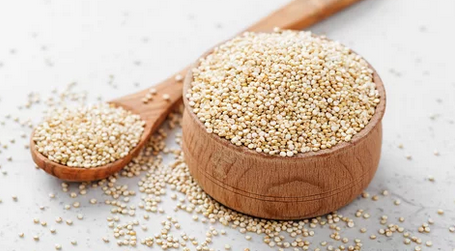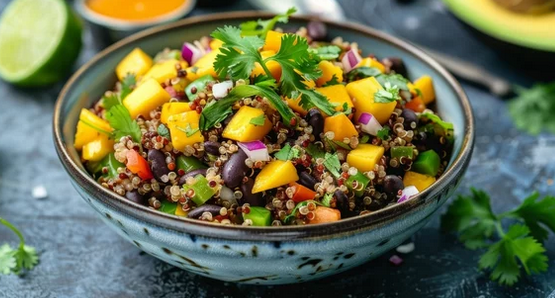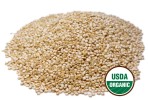Understanding Quinoa: The Nutrient-Rich Powerhouse
Quinoa, often labeled a "superfood," has become increasingly popular for its remarkable health benefits and versatility in the kitchen. Native to the Andean region of South America, quinoa has been cultivated for thousands of years and is renowned for its exceptional nutritional profile.
Rich in essential nutrients, quinoa stands out as a complete plant-based protein, containing all nine essential amino acids our bodies require. This makes it a valuable addition to the diets of vegetarians and vegans seeking alternative protein sources. Moreover, quinoa is packed with dietary fiber, supporting digestion and helping to maintain healthy cholesterol levels. It also provides a variety of important vitamins and minerals, including magnesium, iron, zinc, and B vitamins.
 One of quinoa’s unique attributes is that it's gluten-free, making it suitable for individuals with gluten sensitivities or celiac disease. Additionally, its low glycemic index ensures stable blood sugar levels, further enhancing its appeal as a health-conscious food choice.
One of quinoa’s unique attributes is that it's gluten-free, making it suitable for individuals with gluten sensitivities or celiac disease. Additionally, its low glycemic index ensures stable blood sugar levels, further enhancing its appeal as a health-conscious food choice.
Quinoa’s mild, nutty flavor and slightly chewy texture make it an excellent ingredient for a variety of dishes, both savory and sweet. Whether in salads, stir-fries, porridge, or baked goods, the possibilities are vast when incorporating quinoa into your meals.
Macronutrients in Quinoa and Their Health Benefits
Quinoa’s nutritional value is rooted in its balanced macronutrient content. As a complete protein, it offers all nine essential amino acids, vital for tissue repair, hormone production, and immune system support. Its protein profile makes quinoa a standout for anyone looking to boost their intake, especially those on plant-based diets.
Beyond protein, quinoa provides complex carbohydrates, offering a steady source of energy without the quick sugar spikes caused by simple carbs. Its fiber content, which includes both soluble and insoluble forms, promotes digestive health and contributes to feelings of fullness.
Micronutrients in Quinoa: Supporting Overall Health
In addition to macronutrients, quinoa is rich in essential micronutrients that can play key roles in maintaining health. Vitamins like B6, thiamine, riboflavin, niacin, and folate support energy production, brain function, and metabolism. Minerals such as magnesium, phosphorus, manganese, and copper may contribute to bone health, antioxidant defense, and iron absorption.
Quinoa also contains powerful antioxidants, including quercetin and kaempferol, which have been linked to reduced inflammation and improved heart health.
Quinoa: A Complete Protein for Vegetarians and Vegans
Quinoa is a rare plant-based source of complete protein, providing all essential amino acids, making it comparable to animal-based proteins. This makes it particularly beneficial for vegetarians and vegans who may struggle to find adequate protein sources. Quinoa’s high fiber content, along with key minerals like iron and magnesium, further enhances its value in plant-based diets.
Additionally, its gluten-free nature and easy digestibility make it a versatile option for a wide range of dietary needs.
Incorporating Quinoa into a Balanced Diet: Meal Ideas
Quinoa is a versatile ingredient that can be incorporated into a wide range of dishes. It serves as an excellent base for salads when combined with fresh vegetables and flavorful dressings. It can also substitute for rice or pasta in stir-fries, pilafs, or stuffed peppers.
 For breakfast, quinoa can be used in porridge, mixed with milk or plant-based alternatives, and topped with fruits and nuts for added flavor. Quinoa patties or burgers, made by blending quinoa with beans and vegetables, provide a hearty and nutritious option for lunch or dinner.
For breakfast, quinoa can be used in porridge, mixed with milk or plant-based alternatives, and topped with fruits and nuts for added flavor. Quinoa patties or burgers, made by blending quinoa with beans and vegetables, provide a hearty and nutritious option for lunch or dinner.
Tips for Buying and Cooking Quinoa
To maximize quinoa’s nutritional value, opt for organic varieties, rinse it thoroughly before cooking to remove its natural bitterness, and use a 2:1 water-to-quinoa ratio. Cooking with vegetable broth or adding herbs and vegetables during preparation can enhance both flavor and nutritional content. Mixing quinoa with other wholesome ingredients like beans and nuts creates balanced, nutrient-dense meals.

